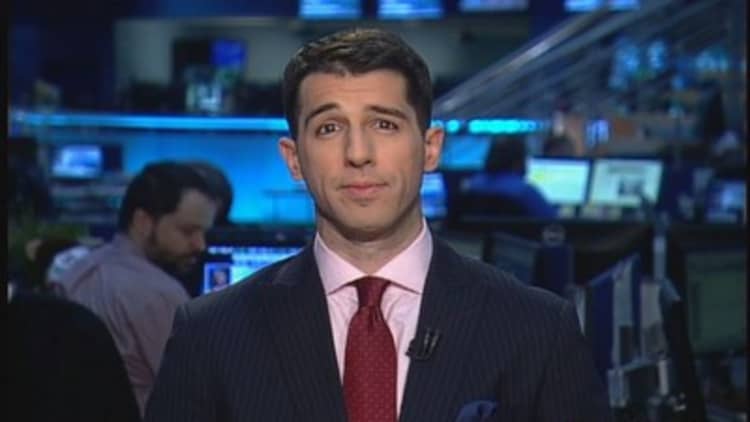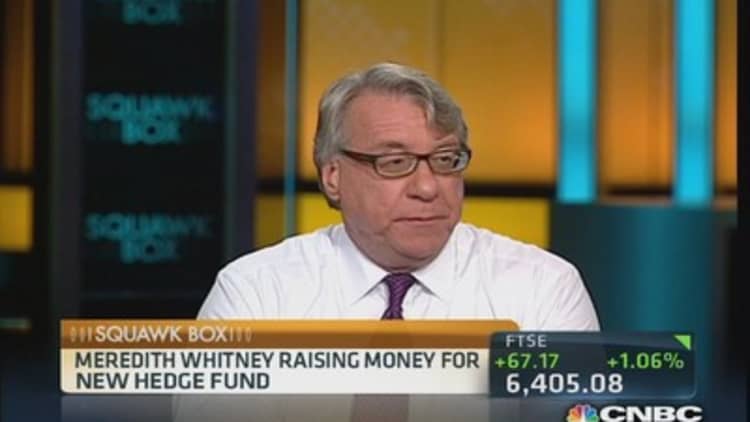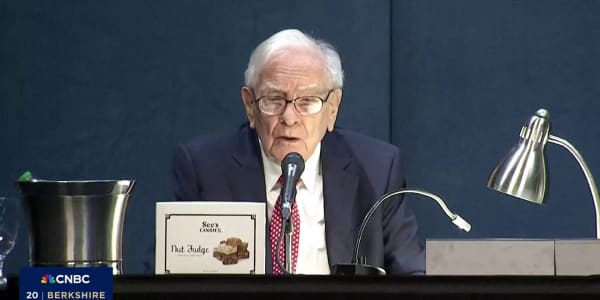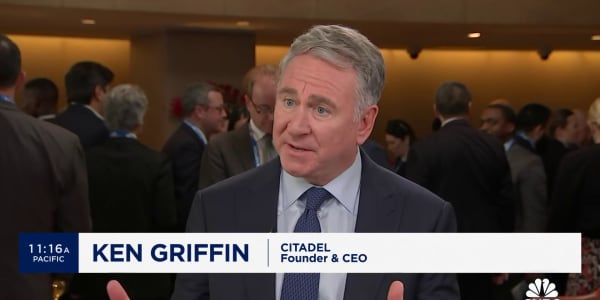
Former star financial analyst Meredith Whitney is hoping to make a big comeback—and big money—by applying her financial advisory skills to the hedge fund game. But it's not clear if investors will buy in.
Undisclosed executives at $35 billion London-based hedge fund firm BlueCrest Capital Management form one initial set of supporters.
They are giving personal money as so-called anchor investors in Whitney's new fund, Kenbelle Capital, according to two people familiar with the situation. Bloomberg first reported the BlueCrest news.
And Whitney has some high-powered fundraising help: JPMorgan Chase and Goldman Sachs are Kenbelle's prime brokers, according to marketing materials from July obtained by CNBC.com. Kenbelle was a featured fund at a JPMorgan-sponsored showcase of up-and-coming managers on Tuesday in New York, according to people familiar with the situation, and Whitney presented at the event.
But many investors appear skeptical of the former sub-prime Cassandra's pitch.
"There's a long list of failed managers who look to raise money off of one correct market call made in the past, so no, I'm passing on this one," said Brad Balter, founder of $1.2 billion Balter Capital Management, which invests in non-brand-name hedge funds and alternative mutual funds.
"This feels much less like a passionate manager launching a fund and more like an attempt to find another source of income post her old firm shuttering. Plus there are thousands of long-short equity hedge funds out there already—who needs another?" he added.

(Read more: Meredith Whitney: I Have Doubts All the Time)
In April, Whitney created Kenbelle, a hedge fund based in the same Madison Avenue offices as her financial advisory business, Meredith Whitney Advisory Group. In August, Whitney ended her broker registration for Meredith Whitney Securities, thereby shutting down a key part of her business.
Whitney—who is best known for her prediction as an Oppenheimer analyst of the sub-prime mortgage collapse and Citigroup's frailty before the financial crisis —will now focus on stock picking at her new long-short offering.
Called the American Revival Fund, the new vehicle will invest in stocks following national trends, such as the "long-term demographic rebalancing of (the) U.S. economy rooted in extensive consumer, industry and state specific research," according to the marketing materials.
Building on Whitney's 2010 warning about an impending wave of municipal bond defaults, Kenbelle will invest based on the varying financial health of states. The thesis revolves around the relative lack of debt and faster growth for middle-American states like Ohio, Indiana, Texas and Oklahoma compared to far Western and Eastern states like Florida, California and Arizona.
"Coastal states have seen their (gross domestic product) decelerate markedly, while central states' GDPs have accelerated. Our current investment thesis targets this growing bifurcation," the materials state.
(Read more: Meredith Whitney finally right about muni bonds?)
Whitney, who was named one of Time's 100 Most Influential People in 2009, will be the chief investment officer.
She is joined by portfolio manager and chief risk officer Steve Schwartz, whom Whitney worked with briefly at hedge fund Circle T Partners more than a decade ago.
Schwartz was most recently a portfolio manager at Guggenheim Global Trading from 2011 to 2013; he was also president and chief executive of hedge fund CAVU Capital Advisors from 2006 to 2011 and a portfolio manager at SAC Capital Advisors from 2004 to 2005. Mark Innaimo, previously a trader at broker dealer Bay Crest Partners, will be Kenbelle's senior trader.
It's not clear how much money Kenbelle has raised or when it will formally launch and begin trading. A spokesman for Whitney declined to comment. A spokesman for BlueCrest also declined. Trading began Nov. 1 with $50 million, according to the Bloomberg report Wednesday.
Most hedge fund investors approached by CNBC said they were unlikely to invest because of Whitney's lack of direct money management experience.
"It's moving from a headache (clients) to a stomach ache (managing money)—but in her case it will be more like a full-on flu virus as she's managing headlines and the pains of managing a portfolio," one family office investor said via email. "She had a big call and hasn't availed herself since. It's not the sort of consistency you need in this business."
Said another family office investor: "The precedents for (someone on the) sell side with no experience of managing money launching hedge funds are really poor. I can't think of a single success. I'm not sure what they're thinking."
Others prefer to wait and see how the fund does before investing.
"One great market call followed by mediocre ones and good marketing skills does not make a good hedge fund manager," said another investor at a fund of funds. "If she is actually good, time will tell, so there is no rush to invest."
(Read more: Meredith Whitney is launching a hedge fund: Sources)
A lawyer for Whitney previously told Bloomberg News the fund would attract plenty of capital.
"She has a healthy line of people who have promised to invest," Stanley Arkin of the Arkin Group said on Oct. 10. "She's getting set to run a good-sized fund." Arkin didn't respond to CNBC.com requests for additional comment.
Kenbelle requires a steep $5 million minimum investment—$1 million is more common—and investors must keep their money in for at least a year to not incur a redemption penalty, according to the documents. The fund will also charge the industry standard of 2 percent and 20 percent management and performance fees, respectively.
—By CNBC's Lawrence Delevingne. Follow him on Twitter @ldelevingne.






